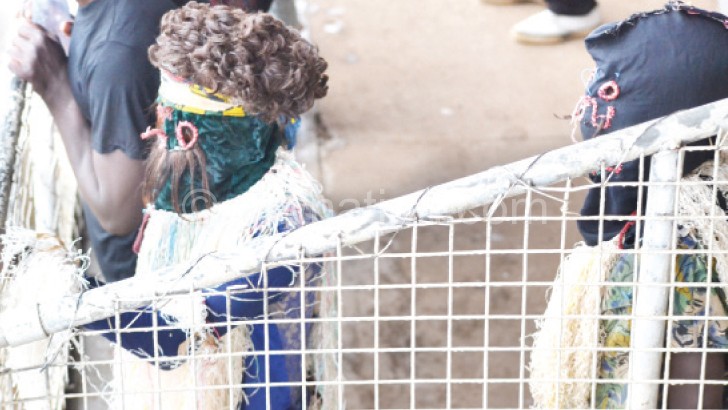Gulewamkulu faces football
That gulewamkulu among the Chewa is a serious matter is beyond debate. Gulewamkulu is a heritage dance which mimics wild animals in every aspect.
The other aspect that sets it apart is that it is a very secretive dance. To make its membership, one has to perform certain rites at a clandestine location, usually a graveyard where initiates receive a moral code of conduct and endure torturous moments.
Originally, nyau used to grace funerals of chiefs and elders of the community, installation or death of a chief and at selected weddings.

But gulewamkulu is also performed for altogether different purpose: rallying support at TNM Super League football matches. Not everyone is amused. The development has raised eyebrows in some quarters, who view it as a dilution of this treasured cultural practice.
TNM Super League rookies Dedza Young Soccer Saints may not have taken the league by storm but they have more than made for their lacklustre performances with whirlwind raising performances from their gulewamkulu support at their matches.
They are, by no means, trailblazers in that aspect. That accolade belongs to another trailblazer Central Region-based club, Civo United, who have been synonymous with gulewamkulu for as long as many of its support base can remember.
Football commentator Mike Bango feels the incorporation of gulewamkulu must be encouraged as it adds to the diversity of football entertainment.
“It’s not wrong as long as it doesn’t cause discomfort to other people, especially the Chewa who treasure gulewamkulu so much and protect it jealously. For that reason, I would propose that the tribe’s cultural anthropologist should be involved so that they give their clearance so as not to go against the Chewa beliefs,” says Bango.
He further wonders whether nyau dancers pay gate charges at the stadiums and if they do, in what capacity. He proposes that gulewamkulu could be roped in to perform during Malawi National Football team engagements.
“But I must repeat here that this should have the blessing of Chewa elders and it could be even be better if it was performed by the elders themselves. This can also serve as a platform to showcase our culture on the international scene,” says Bango.
While welcoming the idea, football pundit and former chief executive officer for the Football Association of Malawi (FAM) Charles Nyirenda advises that the involvement of gulewamkulu during football matches must be approached with caution to avoid causing unnecessary challenges.
“Gulewamkulu is a controlled affair with its own unique protocols and the issue should be looked into considering all implications. If you recall very well, performing the dance during weddings was banned because it has got its own procedures,” Nyirenda says.
Nonetheless, he generally considers the practice of bringing nyau to football matches quite in order so long as this is done in “good spirit.”
“It’s in order and it has a historical precedent. Civo United, when it had players such as lethal striker Zoro Msiska, would take gulewamkulu to their matches in good spirit and it didn’t cause any problems. Today, we don’t know in what spirit teams like Dedza Young Soccer Saints bring their nyau dancers. But if they bring them as part of their dance troupe which forms part of the team’s support army, then it’s in order for me,” he states.
Dyson Gonthi, chairperson of Chewa Heritage Foundation (Chefo) in the Southern Region, feels the practice must be encouraged as it adds zest to the matches and tends to calm tempers of both players and supporters.
“I personally find no problem with gulewamkulu dancing at stadiums because it diverts people’s attention a little bit and to some extent calms tempers especially of rival fans and players who could otherwise be engaging in fierce fights. So long as proper procedures are followed, thus the involvement of dambwe elders, I have no problem. It’s one way of promoting our culture and remember even Unesco recognises it as a heritage dance.”
But group village head Katengeza of Salima says the tendency must stop immediately as it is an insult to the Chewas.
“You cannot tell whether the one doing the nyau is a Chewa or not. In fact, that dance must be authorised by chiefs and no one has the right to let the ‘animals’ out without the consent of the local authorities like chiefs,” charged the chiefs.
Katengeza has the last word and he deems the whole practice unthinkable and discourages it.
“Let football be football and it should not be used to dilute our rich traditions. We should not forget that football is a foreign practice and our ancestors never played football,” retorts Katengeza. n





